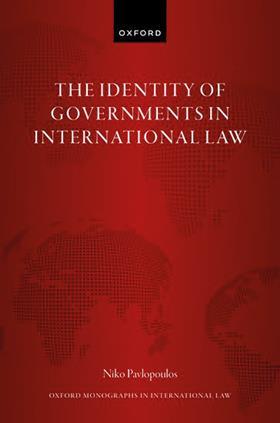A guide to deciding who is legitimately in charge
The Identity of Governments in International Law
Niko Pavlopoulos
£90, Oxford University Press
★★★★★
How do you identify the legitimate government of a country? This would appear to be a simple question and, typically, the answer will be the group of persons appointed to govern by the party, or parties, elected in a national plebiscite conducted in accordance with the constitutional law of that country. In a one-party state, the identity of the government will seem even more obvious. But what if the result of a national election is disputed, or the country is embroiled in a civil war or coup d’etat, and there are two groups each seeking international recognition as the government? This is not an abstract academic exercise and examples arise with alarming frequency, such as in Spain (1936-1939), Rhodesia, Northern Cyprus, Kosovo, Cambodia, Afghanistan, Myanmar, Somalia and Venezuala.
This excellent book explores whether there exists an objective framework for identifying the government of a state. It is clear that a claimant to governmental status need not be democratically representative. In 1949, Mao Zedong’s communist forces defeated Chiang Kai-Shek’s Republic of China (ROC) forces and established the People’s Republic of China (PRC). Chiang Kai-Shek and his ROC government fled to Taiwan. Throughout the 1950s and 1960s, the United Nations and most non-communist nations still recognised the ROC as the sole government of China. In 1971, the UN General Assembly voted to move the ‘China’ United Nations seat from the ROC to the PRC. The US continued to recognise the PRC as the legitimate representative of all China until 1979.

The decision of an international organisation, such as the United Nations, to accept as effective for its purposes the ostensible representation of a state tends, we are told, to turn at least in part on the organisation’s acceptance of the claimant to governmental status. The persons comprising the government of a state occupy certain specific offices. In so doing, the government of a state performs a distinctive function in the representation of that state for the purposes of international law. Indeed, the author explains that it is generally only the representation of a state through its government that is effective as a matter of international law.
A state can recognise governmental status of another state in various ways. One way is for it to make a statement expressly recognising a claimant’s governmental status. In May 2018, a presidential election took place in Venezuela, which the incumbent, Nicolás Maduro Moros, claimed to have won. On 4 February 2019, the then UK foreign secretary declared that the UK recognised Maduro’s rival, Juan Guaidó, ‘as the constitutional interim president of Venezuela, until credible presidential elections can be held’. Maduro and Guaidó both claimed authority to act on behalf of the Central Bank of Venezuela in respect of gold reserves of about US$1.95bn held by the Bank of England. In a dispute concerning those gold reserves, the UK Supreme Court ruled that, under the UK’s constitutional arrangements, the recognition of foreign states, governments and heads of states is a matter for the executive, and that courts in the UK accept statements made by the executive as to whether an individual is to be regarded as a head of state as final. The UK government’s statement was a clear and unequivocal recognition of Guaidó as president of Venezuela, which necessarily entailed that Maduro was not. In the UK, this rule is called the ‘one voice principle’.
This book by Niko Pavlopoulos, an associate legal officer at the International Court of Justice in The Hague, provides a thorough account of the international legal regulation of governmental status. It examines the concept of the government of a state in international law, before investigating the law on recognition of governments and the criteria for governmental status under international law. It also considers the identity of governments in the context of international organisations.
Kevin McVeigh is a partner at Elliott Duffy Garrett Solicitors, Belfast































No comments yet